Assessment 1 Report: Early Childhood Education Theories and Practice
VerifiedAdded on 2022/08/18
|10
|2242
|24
Report
AI Summary
This report delves into the critical aspects of early childhood education, emphasizing the significance of early childhood theories and child development in shaping educational practices. It explores how these theories underpin documentation, planning, and assessment strategies for young children, highlighting the importance of understanding cognitive, emotional, and social growth. The report also examines the role of play-based pedagogy in fostering learning and development, emphasizing its impact on language skills, social-emotional development, and overall educational outcomes. The analysis underscores the need for educators to adopt a holistic approach, integrating theory and practice to create effective and engaging learning environments for young children. The report references various scholarly sources to support its arguments, providing a comprehensive overview of the topic.
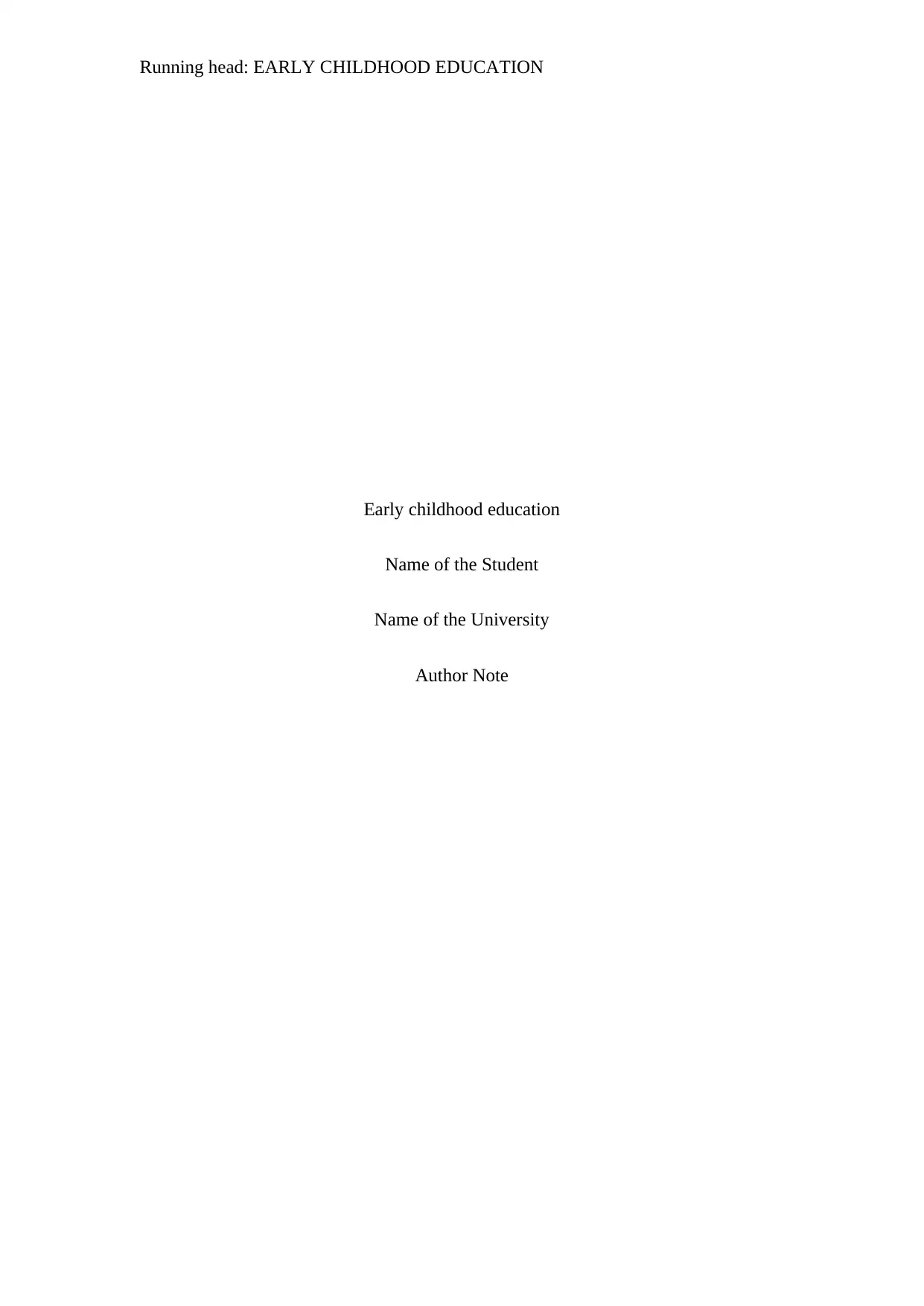
Running head: EARLY CHILDHOOD EDUCATION
Early childhood education
Name of the Student
Name of the University
Author Note
Early childhood education
Name of the Student
Name of the University
Author Note
Paraphrase This Document
Need a fresh take? Get an instant paraphrase of this document with our AI Paraphraser
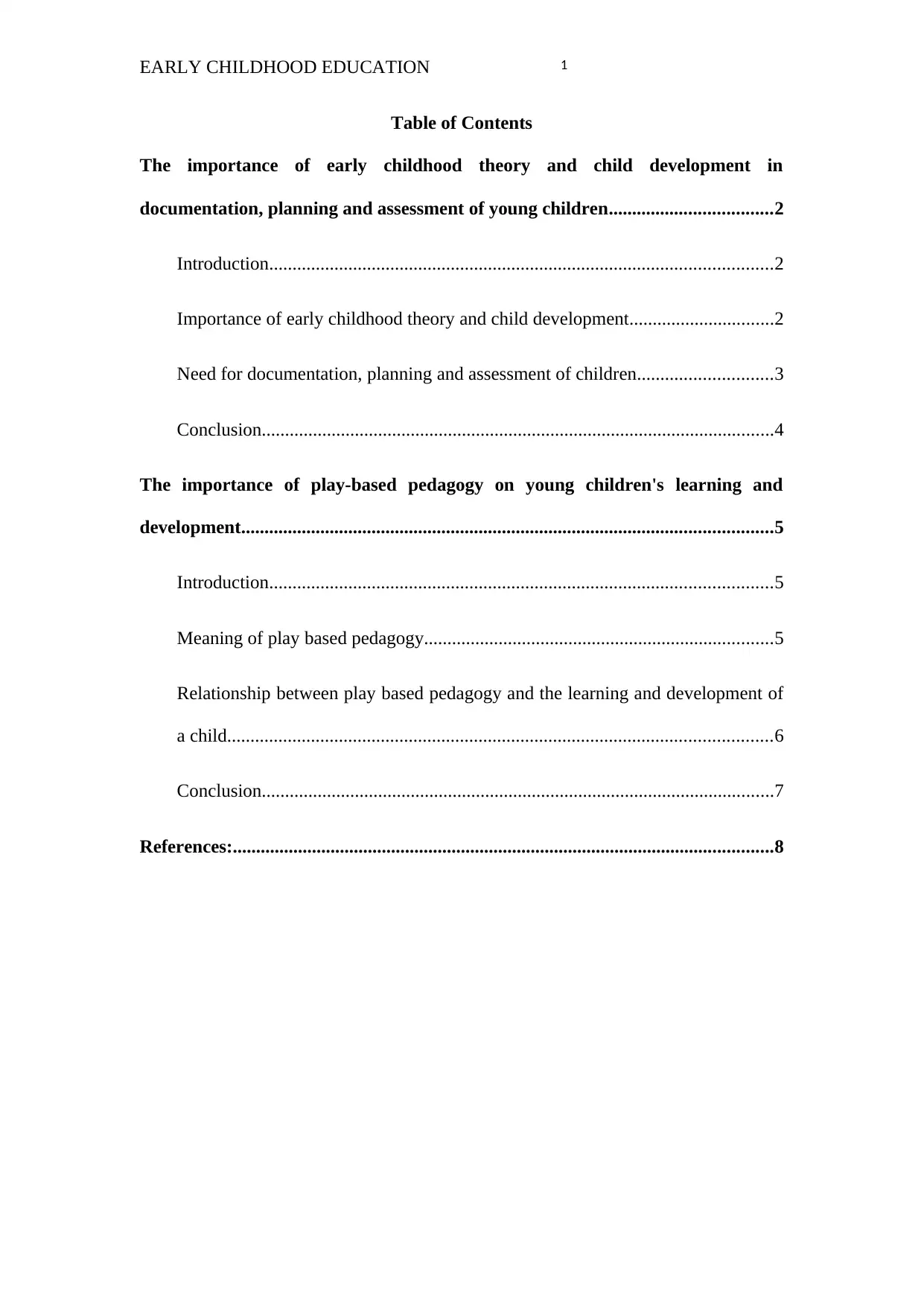
1EARLY CHILDHOOD EDUCATION
Table of Contents
The importance of early childhood theory and child development in
documentation, planning and assessment of young children...................................2
Introduction............................................................................................................2
Importance of early childhood theory and child development...............................2
Need for documentation, planning and assessment of children.............................3
Conclusion..............................................................................................................4
The importance of play-based pedagogy on young children's learning and
development..................................................................................................................5
Introduction............................................................................................................5
Meaning of play based pedagogy...........................................................................5
Relationship between play based pedagogy and the learning and development of
a child.....................................................................................................................6
Conclusion..............................................................................................................7
References:....................................................................................................................8
Table of Contents
The importance of early childhood theory and child development in
documentation, planning and assessment of young children...................................2
Introduction............................................................................................................2
Importance of early childhood theory and child development...............................2
Need for documentation, planning and assessment of children.............................3
Conclusion..............................................................................................................4
The importance of play-based pedagogy on young children's learning and
development..................................................................................................................5
Introduction............................................................................................................5
Meaning of play based pedagogy...........................................................................5
Relationship between play based pedagogy and the learning and development of
a child.....................................................................................................................6
Conclusion..............................................................................................................7
References:....................................................................................................................8
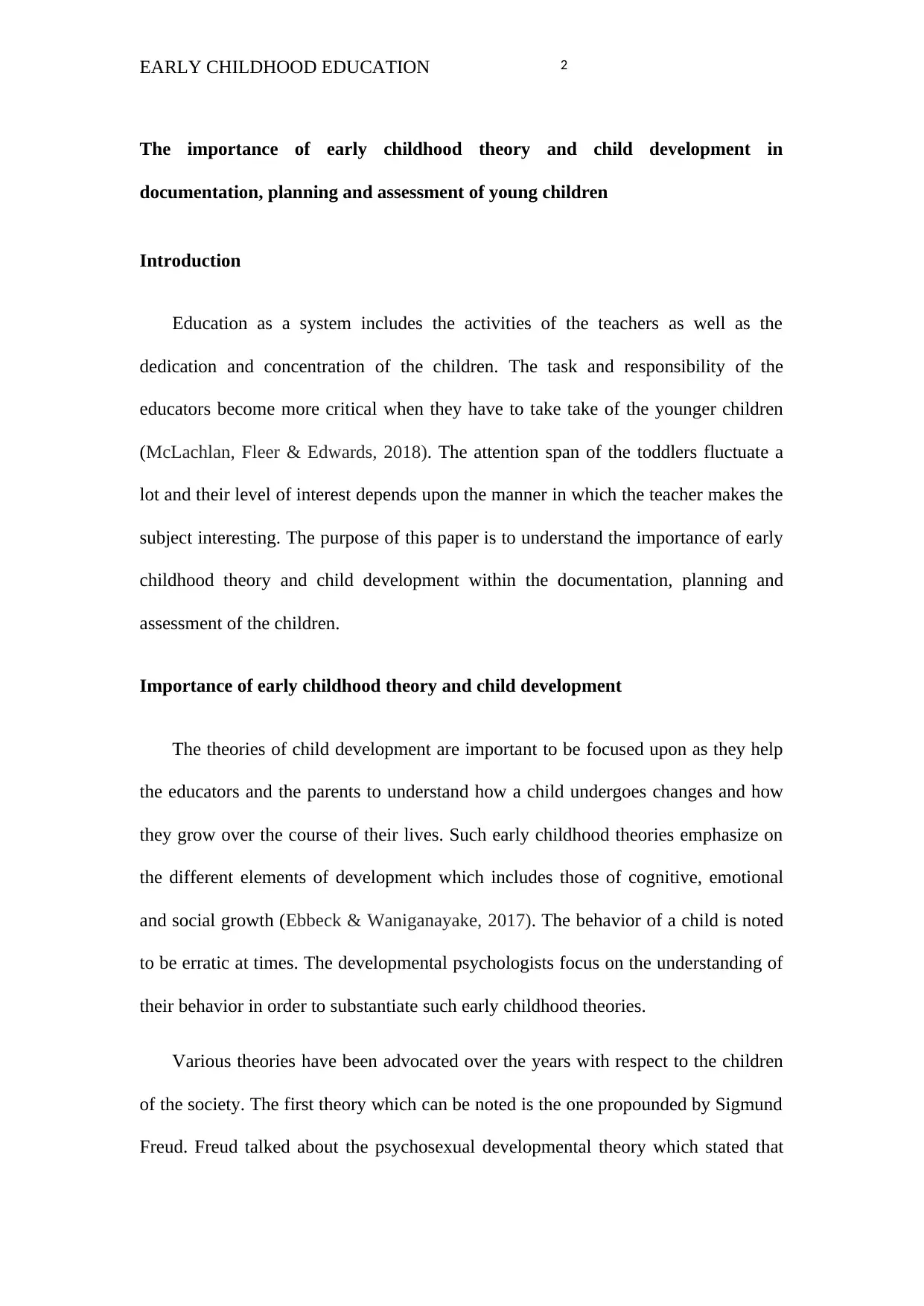
2EARLY CHILDHOOD EDUCATION
The importance of early childhood theory and child development in
documentation, planning and assessment of young children
Introduction
Education as a system includes the activities of the teachers as well as the
dedication and concentration of the children. The task and responsibility of the
educators become more critical when they have to take take of the younger children
(McLachlan, Fleer & Edwards, 2018). The attention span of the toddlers fluctuate a
lot and their level of interest depends upon the manner in which the teacher makes the
subject interesting. The purpose of this paper is to understand the importance of early
childhood theory and child development within the documentation, planning and
assessment of the children.
Importance of early childhood theory and child development
The theories of child development are important to be focused upon as they help
the educators and the parents to understand how a child undergoes changes and how
they grow over the course of their lives. Such early childhood theories emphasize on
the different elements of development which includes those of cognitive, emotional
and social growth (Ebbeck & Waniganayake, 2017). The behavior of a child is noted
to be erratic at times. The developmental psychologists focus on the understanding of
their behavior in order to substantiate such early childhood theories.
Various theories have been advocated over the years with respect to the children
of the society. The first theory which can be noted is the one propounded by Sigmund
Freud. Freud talked about the psychosexual developmental theory which stated that
The importance of early childhood theory and child development in
documentation, planning and assessment of young children
Introduction
Education as a system includes the activities of the teachers as well as the
dedication and concentration of the children. The task and responsibility of the
educators become more critical when they have to take take of the younger children
(McLachlan, Fleer & Edwards, 2018). The attention span of the toddlers fluctuate a
lot and their level of interest depends upon the manner in which the teacher makes the
subject interesting. The purpose of this paper is to understand the importance of early
childhood theory and child development within the documentation, planning and
assessment of the children.
Importance of early childhood theory and child development
The theories of child development are important to be focused upon as they help
the educators and the parents to understand how a child undergoes changes and how
they grow over the course of their lives. Such early childhood theories emphasize on
the different elements of development which includes those of cognitive, emotional
and social growth (Ebbeck & Waniganayake, 2017). The behavior of a child is noted
to be erratic at times. The developmental psychologists focus on the understanding of
their behavior in order to substantiate such early childhood theories.
Various theories have been advocated over the years with respect to the children
of the society. The first theory which can be noted is the one propounded by Sigmund
Freud. Freud talked about the psychosexual developmental theory which stated that
⊘ This is a preview!⊘
Do you want full access?
Subscribe today to unlock all pages.

Trusted by 1+ million students worldwide
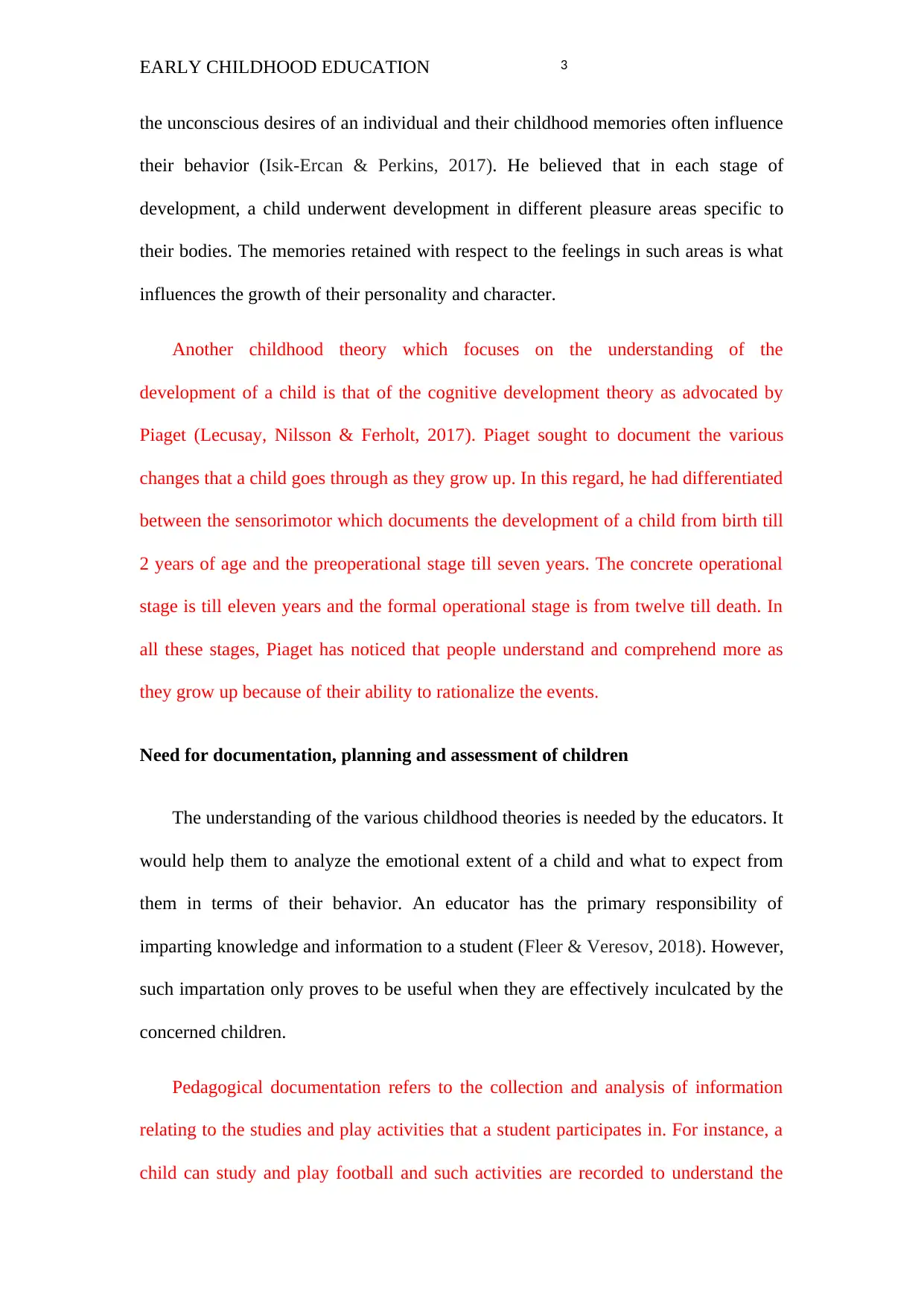
3EARLY CHILDHOOD EDUCATION
the unconscious desires of an individual and their childhood memories often influence
their behavior (Isik-Ercan & Perkins, 2017). He believed that in each stage of
development, a child underwent development in different pleasure areas specific to
their bodies. The memories retained with respect to the feelings in such areas is what
influences the growth of their personality and character.
Another childhood theory which focuses on the understanding of the
development of a child is that of the cognitive development theory as advocated by
Piaget (Lecusay, Nilsson & Ferholt, 2017). Piaget sought to document the various
changes that a child goes through as they grow up. In this regard, he had differentiated
between the sensorimotor which documents the development of a child from birth till
2 years of age and the preoperational stage till seven years. The concrete operational
stage is till eleven years and the formal operational stage is from twelve till death. In
all these stages, Piaget has noticed that people understand and comprehend more as
they grow up because of their ability to rationalize the events.
Need for documentation, planning and assessment of children
The understanding of the various childhood theories is needed by the educators. It
would help them to analyze the emotional extent of a child and what to expect from
them in terms of their behavior. An educator has the primary responsibility of
imparting knowledge and information to a student (Fleer & Veresov, 2018). However,
such impartation only proves to be useful when they are effectively inculcated by the
concerned children.
Pedagogical documentation refers to the collection and analysis of information
relating to the studies and play activities that a student participates in. For instance, a
child can study and play football and such activities are recorded to understand the
the unconscious desires of an individual and their childhood memories often influence
their behavior (Isik-Ercan & Perkins, 2017). He believed that in each stage of
development, a child underwent development in different pleasure areas specific to
their bodies. The memories retained with respect to the feelings in such areas is what
influences the growth of their personality and character.
Another childhood theory which focuses on the understanding of the
development of a child is that of the cognitive development theory as advocated by
Piaget (Lecusay, Nilsson & Ferholt, 2017). Piaget sought to document the various
changes that a child goes through as they grow up. In this regard, he had differentiated
between the sensorimotor which documents the development of a child from birth till
2 years of age and the preoperational stage till seven years. The concrete operational
stage is till eleven years and the formal operational stage is from twelve till death. In
all these stages, Piaget has noticed that people understand and comprehend more as
they grow up because of their ability to rationalize the events.
Need for documentation, planning and assessment of children
The understanding of the various childhood theories is needed by the educators. It
would help them to analyze the emotional extent of a child and what to expect from
them in terms of their behavior. An educator has the primary responsibility of
imparting knowledge and information to a student (Fleer & Veresov, 2018). However,
such impartation only proves to be useful when they are effectively inculcated by the
concerned children.
Pedagogical documentation refers to the collection and analysis of information
relating to the studies and play activities that a student participates in. For instance, a
child can study and play football and such activities are recorded to understand the
Paraphrase This Document
Need a fresh take? Get an instant paraphrase of this document with our AI Paraphraser
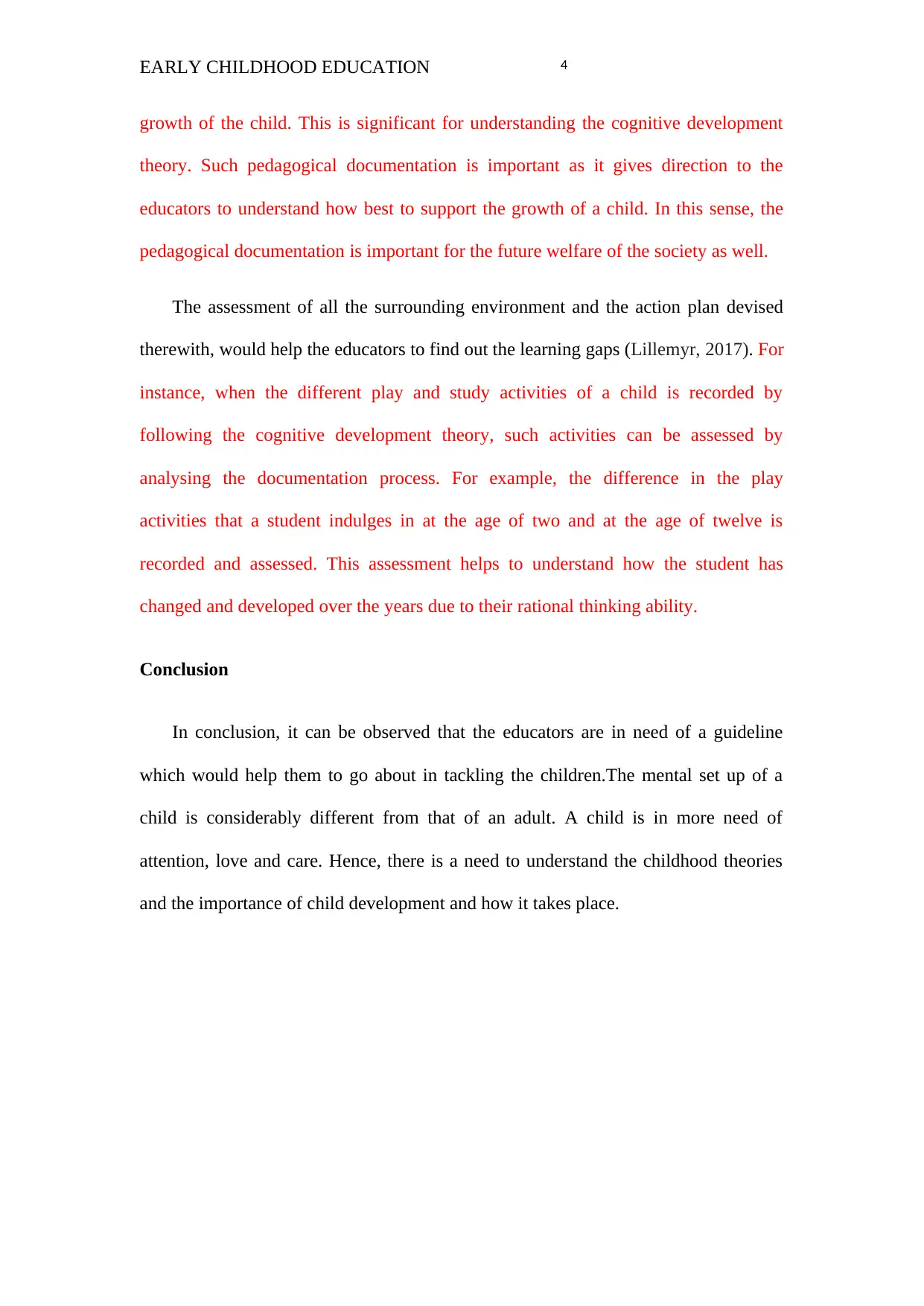
4EARLY CHILDHOOD EDUCATION
growth of the child. This is significant for understanding the cognitive development
theory. Such pedagogical documentation is important as it gives direction to the
educators to understand how best to support the growth of a child. In this sense, the
pedagogical documentation is important for the future welfare of the society as well.
The assessment of all the surrounding environment and the action plan devised
therewith, would help the educators to find out the learning gaps (Lillemyr, 2017). For
instance, when the different play and study activities of a child is recorded by
following the cognitive development theory, such activities can be assessed by
analysing the documentation process. For example, the difference in the play
activities that a student indulges in at the age of two and at the age of twelve is
recorded and assessed. This assessment helps to understand how the student has
changed and developed over the years due to their rational thinking ability.
Conclusion
In conclusion, it can be observed that the educators are in need of a guideline
which would help them to go about in tackling the children.The mental set up of a
child is considerably different from that of an adult. A child is in more need of
attention, love and care. Hence, there is a need to understand the childhood theories
and the importance of child development and how it takes place.
growth of the child. This is significant for understanding the cognitive development
theory. Such pedagogical documentation is important as it gives direction to the
educators to understand how best to support the growth of a child. In this sense, the
pedagogical documentation is important for the future welfare of the society as well.
The assessment of all the surrounding environment and the action plan devised
therewith, would help the educators to find out the learning gaps (Lillemyr, 2017). For
instance, when the different play and study activities of a child is recorded by
following the cognitive development theory, such activities can be assessed by
analysing the documentation process. For example, the difference in the play
activities that a student indulges in at the age of two and at the age of twelve is
recorded and assessed. This assessment helps to understand how the student has
changed and developed over the years due to their rational thinking ability.
Conclusion
In conclusion, it can be observed that the educators are in need of a guideline
which would help them to go about in tackling the children.The mental set up of a
child is considerably different from that of an adult. A child is in more need of
attention, love and care. Hence, there is a need to understand the childhood theories
and the importance of child development and how it takes place.
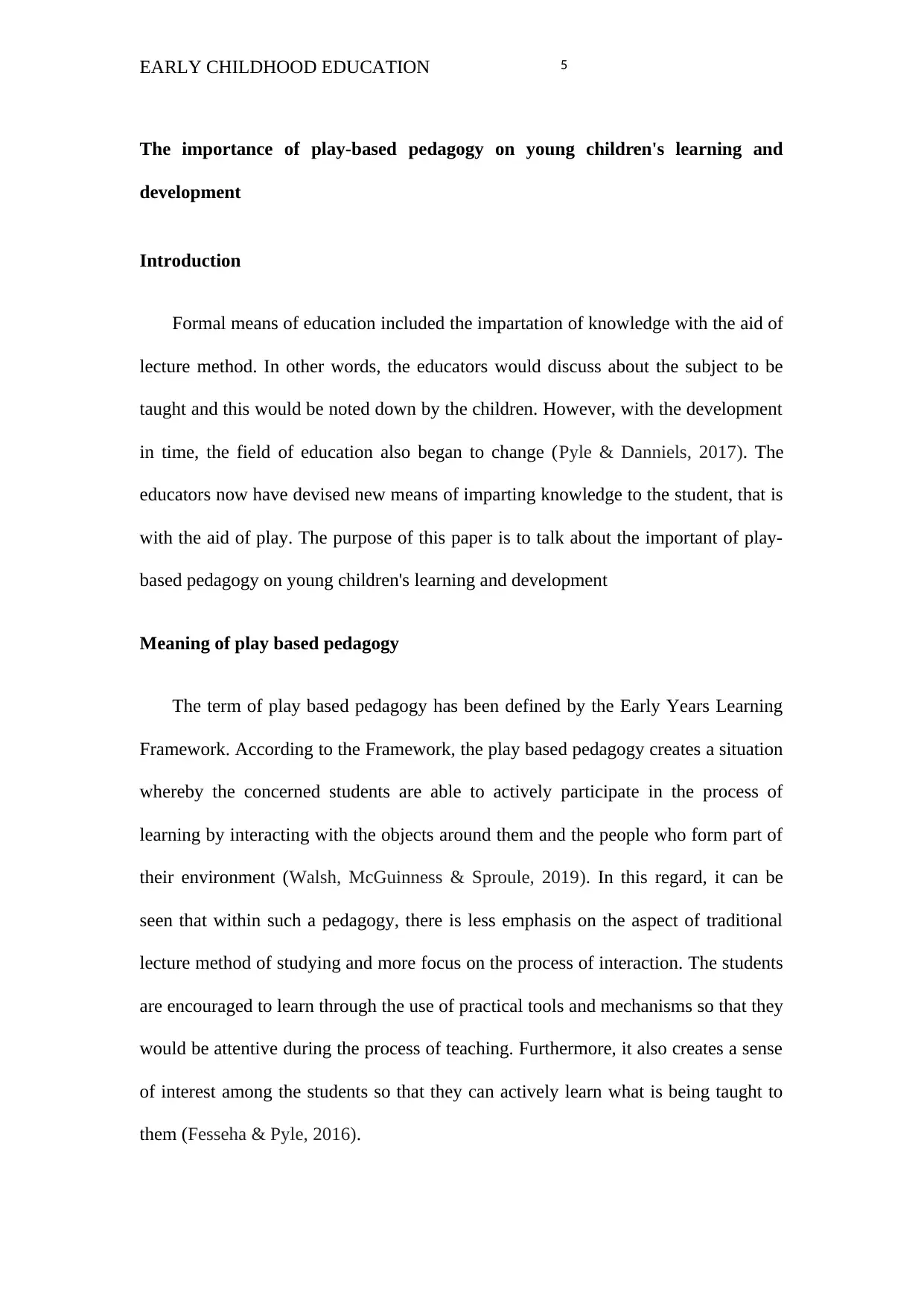
5EARLY CHILDHOOD EDUCATION
The importance of play-based pedagogy on young children's learning and
development
Introduction
Formal means of education included the impartation of knowledge with the aid of
lecture method. In other words, the educators would discuss about the subject to be
taught and this would be noted down by the children. However, with the development
in time, the field of education also began to change (Pyle & Danniels, 2017). The
educators now have devised new means of imparting knowledge to the student, that is
with the aid of play. The purpose of this paper is to talk about the important of play-
based pedagogy on young children's learning and development
Meaning of play based pedagogy
The term of play based pedagogy has been defined by the Early Years Learning
Framework. According to the Framework, the play based pedagogy creates a situation
whereby the concerned students are able to actively participate in the process of
learning by interacting with the objects around them and the people who form part of
their environment (Walsh, McGuinness & Sproule, 2019). In this regard, it can be
seen that within such a pedagogy, there is less emphasis on the aspect of traditional
lecture method of studying and more focus on the process of interaction. The students
are encouraged to learn through the use of practical tools and mechanisms so that they
would be attentive during the process of teaching. Furthermore, it also creates a sense
of interest among the students so that they can actively learn what is being taught to
them (Fesseha & Pyle, 2016).
The importance of play-based pedagogy on young children's learning and
development
Introduction
Formal means of education included the impartation of knowledge with the aid of
lecture method. In other words, the educators would discuss about the subject to be
taught and this would be noted down by the children. However, with the development
in time, the field of education also began to change (Pyle & Danniels, 2017). The
educators now have devised new means of imparting knowledge to the student, that is
with the aid of play. The purpose of this paper is to talk about the important of play-
based pedagogy on young children's learning and development
Meaning of play based pedagogy
The term of play based pedagogy has been defined by the Early Years Learning
Framework. According to the Framework, the play based pedagogy creates a situation
whereby the concerned students are able to actively participate in the process of
learning by interacting with the objects around them and the people who form part of
their environment (Walsh, McGuinness & Sproule, 2019). In this regard, it can be
seen that within such a pedagogy, there is less emphasis on the aspect of traditional
lecture method of studying and more focus on the process of interaction. The students
are encouraged to learn through the use of practical tools and mechanisms so that they
would be attentive during the process of teaching. Furthermore, it also creates a sense
of interest among the students so that they can actively learn what is being taught to
them (Fesseha & Pyle, 2016).
⊘ This is a preview!⊘
Do you want full access?
Subscribe today to unlock all pages.

Trusted by 1+ million students worldwide
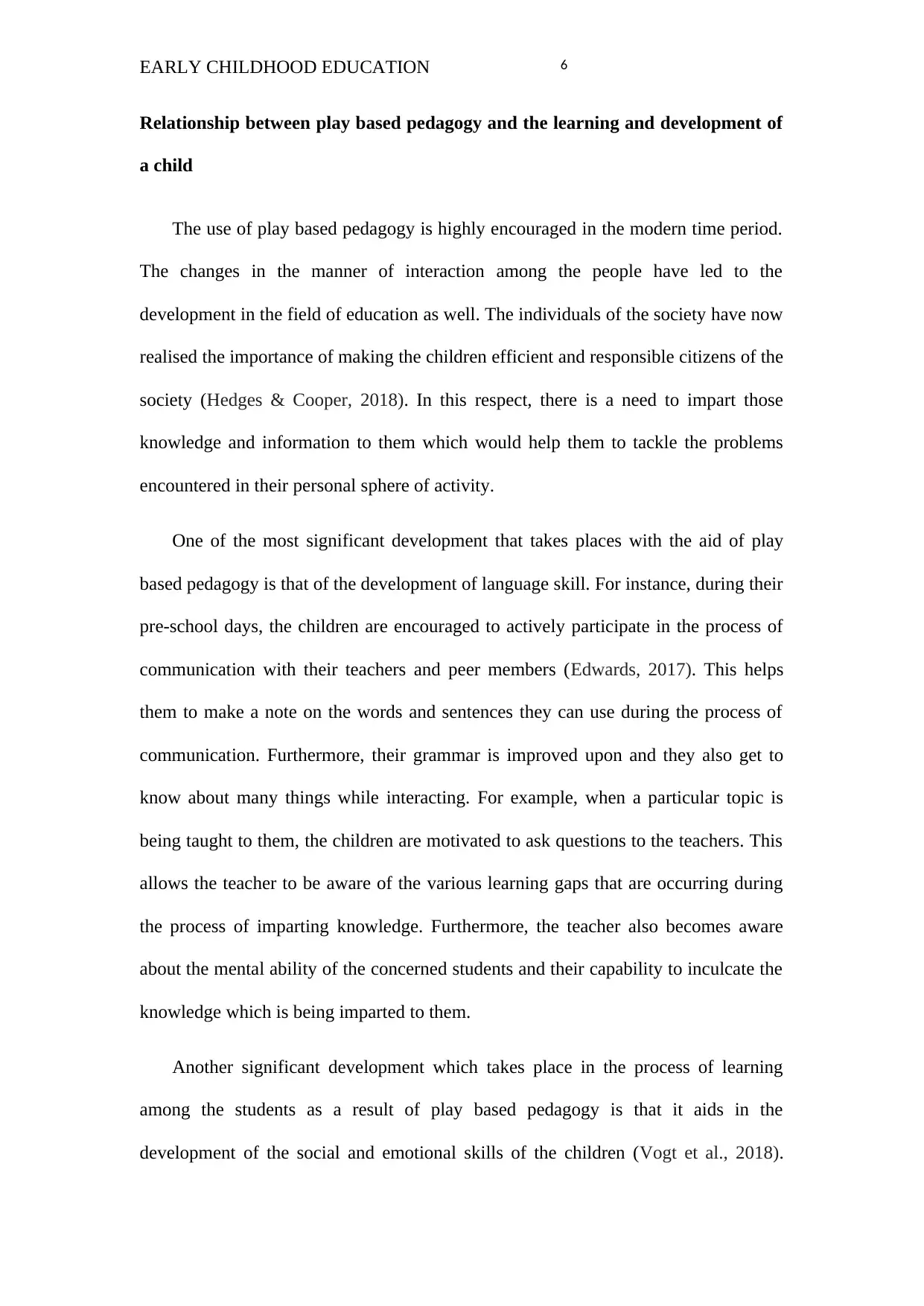
6EARLY CHILDHOOD EDUCATION
Relationship between play based pedagogy and the learning and development of
a child
The use of play based pedagogy is highly encouraged in the modern time period.
The changes in the manner of interaction among the people have led to the
development in the field of education as well. The individuals of the society have now
realised the importance of making the children efficient and responsible citizens of the
society (Hedges & Cooper, 2018). In this respect, there is a need to impart those
knowledge and information to them which would help them to tackle the problems
encountered in their personal sphere of activity.
One of the most significant development that takes places with the aid of play
based pedagogy is that of the development of language skill. For instance, during their
pre-school days, the children are encouraged to actively participate in the process of
communication with their teachers and peer members (Edwards, 2017). This helps
them to make a note on the words and sentences they can use during the process of
communication. Furthermore, their grammar is improved upon and they also get to
know about many things while interacting. For example, when a particular topic is
being taught to them, the children are motivated to ask questions to the teachers. This
allows the teacher to be aware of the various learning gaps that are occurring during
the process of imparting knowledge. Furthermore, the teacher also becomes aware
about the mental ability of the concerned students and their capability to inculcate the
knowledge which is being imparted to them.
Another significant development which takes place in the process of learning
among the students as a result of play based pedagogy is that it aids in the
development of the social and emotional skills of the children (Vogt et al., 2018).
Relationship between play based pedagogy and the learning and development of
a child
The use of play based pedagogy is highly encouraged in the modern time period.
The changes in the manner of interaction among the people have led to the
development in the field of education as well. The individuals of the society have now
realised the importance of making the children efficient and responsible citizens of the
society (Hedges & Cooper, 2018). In this respect, there is a need to impart those
knowledge and information to them which would help them to tackle the problems
encountered in their personal sphere of activity.
One of the most significant development that takes places with the aid of play
based pedagogy is that of the development of language skill. For instance, during their
pre-school days, the children are encouraged to actively participate in the process of
communication with their teachers and peer members (Edwards, 2017). This helps
them to make a note on the words and sentences they can use during the process of
communication. Furthermore, their grammar is improved upon and they also get to
know about many things while interacting. For example, when a particular topic is
being taught to them, the children are motivated to ask questions to the teachers. This
allows the teacher to be aware of the various learning gaps that are occurring during
the process of imparting knowledge. Furthermore, the teacher also becomes aware
about the mental ability of the concerned students and their capability to inculcate the
knowledge which is being imparted to them.
Another significant development which takes place in the process of learning
among the students as a result of play based pedagogy is that it aids in the
development of the social and emotional skills of the children (Vogt et al., 2018).
Paraphrase This Document
Need a fresh take? Get an instant paraphrase of this document with our AI Paraphraser
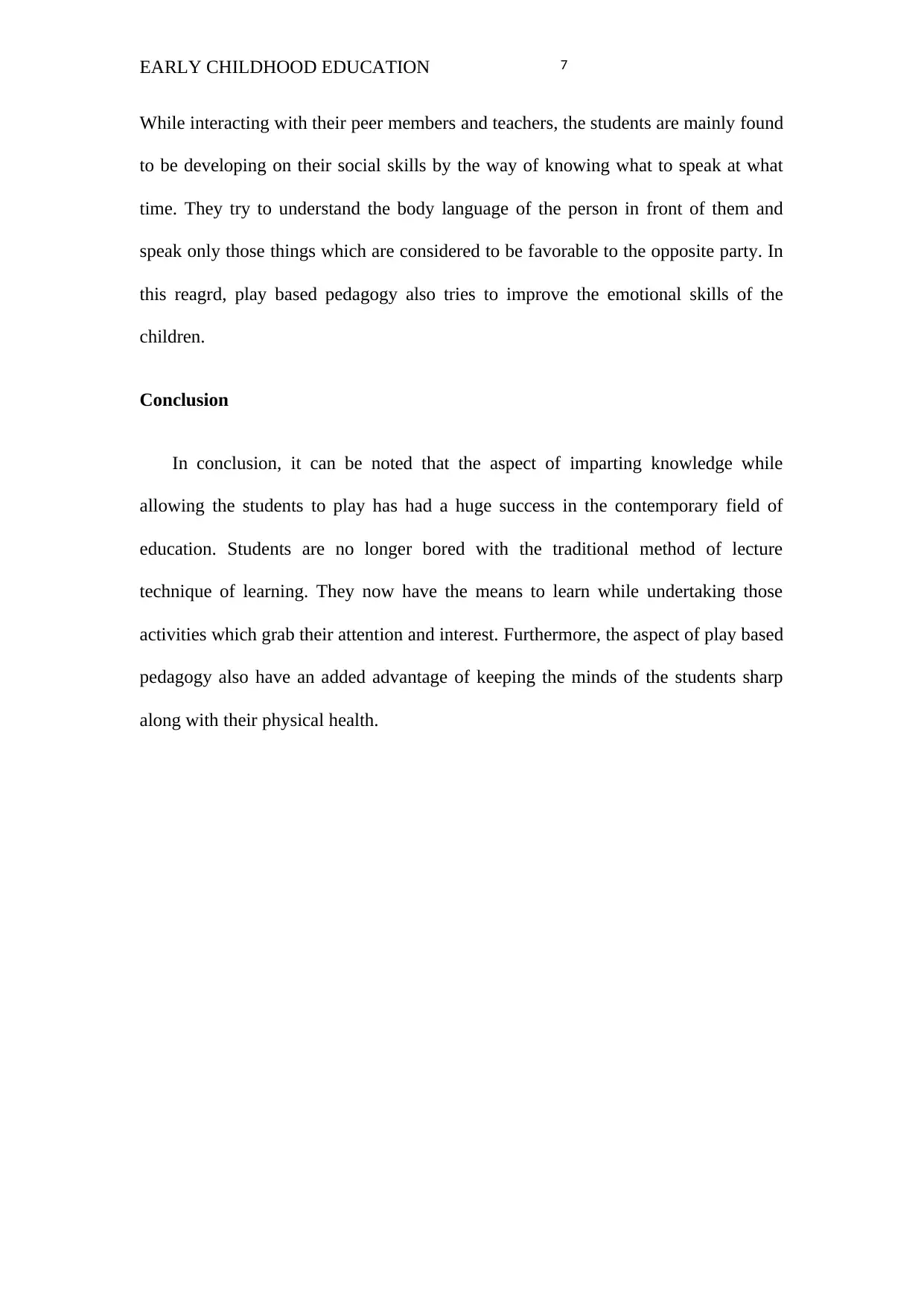
7EARLY CHILDHOOD EDUCATION
While interacting with their peer members and teachers, the students are mainly found
to be developing on their social skills by the way of knowing what to speak at what
time. They try to understand the body language of the person in front of them and
speak only those things which are considered to be favorable to the opposite party. In
this reagrd, play based pedagogy also tries to improve the emotional skills of the
children.
Conclusion
In conclusion, it can be noted that the aspect of imparting knowledge while
allowing the students to play has had a huge success in the contemporary field of
education. Students are no longer bored with the traditional method of lecture
technique of learning. They now have the means to learn while undertaking those
activities which grab their attention and interest. Furthermore, the aspect of play based
pedagogy also have an added advantage of keeping the minds of the students sharp
along with their physical health.
While interacting with their peer members and teachers, the students are mainly found
to be developing on their social skills by the way of knowing what to speak at what
time. They try to understand the body language of the person in front of them and
speak only those things which are considered to be favorable to the opposite party. In
this reagrd, play based pedagogy also tries to improve the emotional skills of the
children.
Conclusion
In conclusion, it can be noted that the aspect of imparting knowledge while
allowing the students to play has had a huge success in the contemporary field of
education. Students are no longer bored with the traditional method of lecture
technique of learning. They now have the means to learn while undertaking those
activities which grab their attention and interest. Furthermore, the aspect of play based
pedagogy also have an added advantage of keeping the minds of the students sharp
along with their physical health.

8EARLY CHILDHOOD EDUCATION
References:
Ebbeck, M., & Waniganayake, M. (2017). Play in early childhood education:
Learning in diverse contexts. Oxford University Press. 198 Madison Avenue,
New York, NY 10016.
Edwards, S. (2017). Play-based learning and intentional teaching: Forever
different?. Australasian Journal of Early Childhood, 42(2), 4-11.
Fesseha, E., & Pyle, A. (2016). Conceptualising play-based learning from
kindergarten teachers’ perspectives. International Journal of Early Years
Education, 24(3), 361-377.
Fleer, M., & Veresov, N. (2018). Cultural-historical and activity theories informing
early childhood education. In International handbook of early childhood
education (pp. 47-76). Springer, Dordrecht.
Hedges, H., & Cooper, M. (2018). Relational play-based pedagogy: Theorising a core
practice in early childhood education. Teachers and Teaching, 24(4), 369-383.
Isik-Ercan, Z., & Perkins, K. (2017). Reflection for meaning and action as an engine
for professional development across multiple early childhood teacher education
contexts. Journal of Early Childhood Teacher Education, 38(4), 342-354.
Lecusay, R., Nilsson, M., & Ferholt, B. (2017). Exploratory playworlds:
Reconsidering the relationship between pretend play and exploration in early
childhood education. In 5th International Congress of the International
Societyfor Cultural-HistoricalActivity Research, Quebec, August 28th-
September1st, 2017..
References:
Ebbeck, M., & Waniganayake, M. (2017). Play in early childhood education:
Learning in diverse contexts. Oxford University Press. 198 Madison Avenue,
New York, NY 10016.
Edwards, S. (2017). Play-based learning and intentional teaching: Forever
different?. Australasian Journal of Early Childhood, 42(2), 4-11.
Fesseha, E., & Pyle, A. (2016). Conceptualising play-based learning from
kindergarten teachers’ perspectives. International Journal of Early Years
Education, 24(3), 361-377.
Fleer, M., & Veresov, N. (2018). Cultural-historical and activity theories informing
early childhood education. In International handbook of early childhood
education (pp. 47-76). Springer, Dordrecht.
Hedges, H., & Cooper, M. (2018). Relational play-based pedagogy: Theorising a core
practice in early childhood education. Teachers and Teaching, 24(4), 369-383.
Isik-Ercan, Z., & Perkins, K. (2017). Reflection for meaning and action as an engine
for professional development across multiple early childhood teacher education
contexts. Journal of Early Childhood Teacher Education, 38(4), 342-354.
Lecusay, R., Nilsson, M., & Ferholt, B. (2017). Exploratory playworlds:
Reconsidering the relationship between pretend play and exploration in early
childhood education. In 5th International Congress of the International
Societyfor Cultural-HistoricalActivity Research, Quebec, August 28th-
September1st, 2017..
⊘ This is a preview!⊘
Do you want full access?
Subscribe today to unlock all pages.

Trusted by 1+ million students worldwide
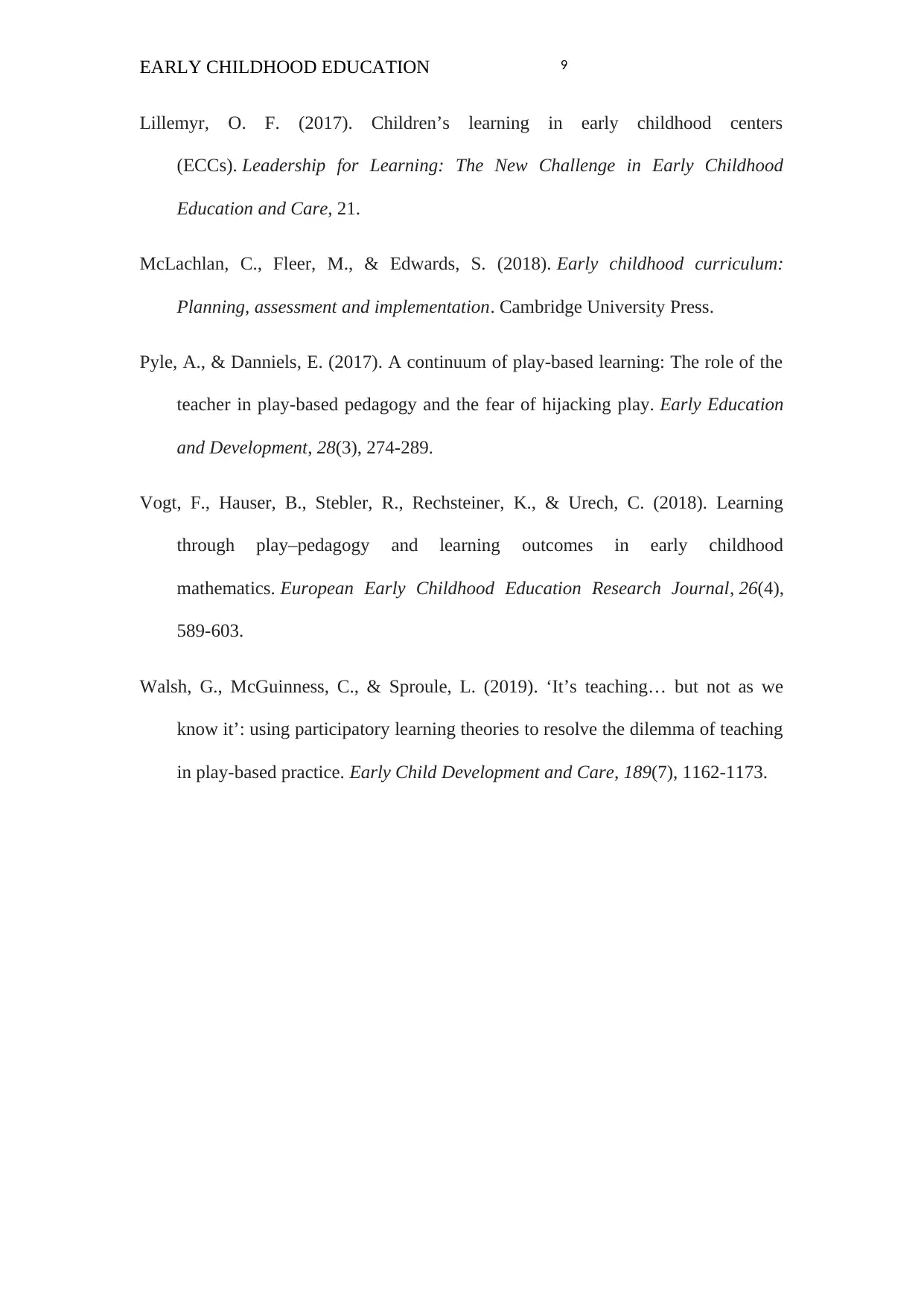
9EARLY CHILDHOOD EDUCATION
Lillemyr, O. F. (2017). Children’s learning in early childhood centers
(ECCs). Leadership for Learning: The New Challenge in Early Childhood
Education and Care, 21.
McLachlan, C., Fleer, M., & Edwards, S. (2018). Early childhood curriculum:
Planning, assessment and implementation. Cambridge University Press.
Pyle, A., & Danniels, E. (2017). A continuum of play-based learning: The role of the
teacher in play-based pedagogy and the fear of hijacking play. Early Education
and Development, 28(3), 274-289.
Vogt, F., Hauser, B., Stebler, R., Rechsteiner, K., & Urech, C. (2018). Learning
through play–pedagogy and learning outcomes in early childhood
mathematics. European Early Childhood Education Research Journal, 26(4),
589-603.
Walsh, G., McGuinness, C., & Sproule, L. (2019). ‘It’s teaching… but not as we
know it’: using participatory learning theories to resolve the dilemma of teaching
in play-based practice. Early Child Development and Care, 189(7), 1162-1173.
Lillemyr, O. F. (2017). Children’s learning in early childhood centers
(ECCs). Leadership for Learning: The New Challenge in Early Childhood
Education and Care, 21.
McLachlan, C., Fleer, M., & Edwards, S. (2018). Early childhood curriculum:
Planning, assessment and implementation. Cambridge University Press.
Pyle, A., & Danniels, E. (2017). A continuum of play-based learning: The role of the
teacher in play-based pedagogy and the fear of hijacking play. Early Education
and Development, 28(3), 274-289.
Vogt, F., Hauser, B., Stebler, R., Rechsteiner, K., & Urech, C. (2018). Learning
through play–pedagogy and learning outcomes in early childhood
mathematics. European Early Childhood Education Research Journal, 26(4),
589-603.
Walsh, G., McGuinness, C., & Sproule, L. (2019). ‘It’s teaching… but not as we
know it’: using participatory learning theories to resolve the dilemma of teaching
in play-based practice. Early Child Development and Care, 189(7), 1162-1173.
1 out of 10
Related Documents
Your All-in-One AI-Powered Toolkit for Academic Success.
+13062052269
info@desklib.com
Available 24*7 on WhatsApp / Email
![[object Object]](/_next/static/media/star-bottom.7253800d.svg)
Unlock your academic potential
Copyright © 2020–2026 A2Z Services. All Rights Reserved. Developed and managed by ZUCOL.





